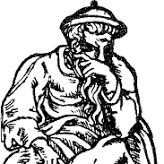I even tried a thread where people accept the divinity of Christ in the Godhead but not in the Trinity sense. I thought some might have had that view. I could understand someone finding some sort of variation of Christ's divinity but no one answered. But, I think there is a modalist here -- just hard to understand what he is saying.
If you are interested, I share that Paul's point in Gal 3:19-20 relies on the gentiles recognizing Christ in the Godhead
#link gal-3-19-20-solved-by-the-shema-in-light-of-christs-divinity.1593/
(I'm hoping my summary of the idea makes sense. )
Thanks, brother-I’ll take a look at it tomorrow; it’s late here in South Africa, 12:47 AM! By the divinity of Christ Jesus, I assume you mean this?
Christ’s "divinity" refers to His divine nature or essence, identifying Him as God. In Christian theology, Christ's divinity means that Jesus possesses the full nature of God-eternal, uncreated, all-knowing, and all-powerful, fully participating in the Godhead while distinct in His personhood as the Son.
In Greek, one of the words associated with Christ's divinity is
θεότης (theotēs), which means "divine nature" or "Godhead." This term is found in Colossians 2:9:
"For in Him dwells all the fullness of the θεότης bodily."
(Colossians 2:9, Lexham English Bible)
Here, theotēs (θεότης) communicates that all of God's fullness or divine essence dwells bodily in Christ, emphasizing that He embodies the complete divine nature within human form.
Another related term is
θεῖος (theios), meaning "divine" or "godlike," used in 2 Peter 1:3-4, where believers are said to partake in the "divine nature." Although theios isn't directly used to describe Christ's divinity here, it contributes to the concept of divine essence shared within the Godhead, of which Christ is an essential part.
GOD. Gr. Theos . The Greek language, being of human origin, utterly fails (and naturally so) to exhibit the wonderful precision of the Hebrew, inasmuch as the language necessarily reflects, and cannot go beyond the knowledge, or rather the lack of knowledge, of the Divine Being apart from revelation.
i. Theos corresponds, generally, with ’Elohim of the O.T., denoting the Creator (see Ap. 4. I); but it corresponds also with El (Ap. 4. IV), and Eloah (Ap. 4. V). Sometimes it corresponds with Jehovah (who is ’Elohim in Covenant relation), in which case it is printed GOD, as in the Old Testament (both A.V. and R.V.).
1. Theos is used in the N.T. of the Father, as the revealed God (see Joh_1:1. Act_17:24, &c.)
2. It is used of the Son (Mat_1:23. Joh_1:1; Joh_20:28, &c. Rom_9:5. 2Pe_1:1. 1Jn_5:20). Cp. Col_2:9 and 2Pe_1:3; 2Pe_1:4.
3. It is used of the Holy Spirit (Act_5:3-4, compared with v . 4).
4. It is used generically, as in Joh_10:34. Act_12:22. 2Co_4:4. Php_3:19, &c.
5. It is used of false gods, as in Act_7:43, &c.; and is printed "god" as in the O.T.
ii. Cognate with Theos , there are three other words to be noted :
1. Theotes , rendered "Deity", and used of Christ. Occurs only in Col_2:9, and has relation to the Godhead personally ; while
2. Theiotes , rendered "Deity" also, is Deity in the abstract . Occurs only in Rom_1:20.
3. Theios , rendered "Divine", and is used of Christ. Occurs only in 2Pe_1:3; 2Pe_1:4; and, with the Article, in Act_17:29, where it is rendered "Godhead". Gr. = that which [is] Divine.
J.

